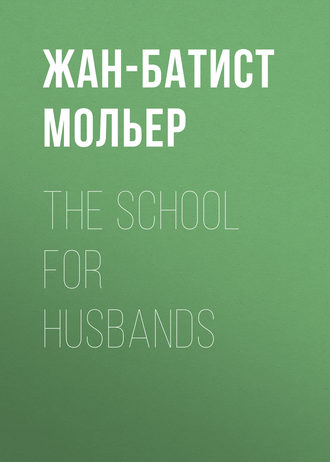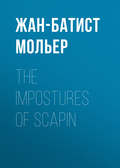
Мольер (Жан-Батист Поклен)
The School for Husbands
DRAMATIS PERSONÆ
SGANARELLE, [Footnote: This part was played by Molière himself.
In the inventory taken after Molière's death, and given by M. Soulié, we find: "A dress for The School for Husbands, consisting of breeches, doublet, cloak, collar, purse and girdle, all of a kind of brown coloured (couleur de muse) satin."]
}
} brothers.
ARISTE, )
VALÈRE, lover to Isabella.
ERGASTE, servant to Valère.
A MAGISTRATE
[Footnote: The original has un Commissaire, who in Molière's time, appears to have been a kind of inferior magistrate under the authority of the Lieutenant-général de la Police. The Commissaires de Police were not established till 1699; and The School for Husbands was played for the first time in 1661.]
A NOTARY
ISABELLA, )
) sisters.
LÉONOR, }
LISETTE, maid to Isabella.
Scene. – A PUBLIC PLACE IN PARIS.
ACT I
SCENE I. – SGANARELLE, ARISTE
SGAN. Pray, brother, let us talk less, and let each of us live as he likes. Though you have the advantage of me in years, and are old enough to be wise, yet I tell you that I mean to receive none of your reproofs; that my fancy is the only counsellor I shall follow, and that I am quite satisfied with my way of living.
AR. But every one condemns it.
SGAN. Yes, fools like yourself, brother.
AR. Thank you very much. It is a pleasant compliment.
SGAN. I should like to know, since one ought to hear everything, what these fine critics blame in me.
AR. That surly and austere temper which shuns all the charms of society, gives a whimsical appearance to all your actions, and makes everything peculiar in you, even your dress.
SGAN. I ought then to make myself a slave in fashion, and not to put on clothes for my own sake? Would you not, my dear elder brother – for, Heaven be thanked, so you are, to tell you plainly, by a matter of twenty years; and that is not worth the trouble of mentioning – would you not, I say, by your precious nonsense, persuade me to adopt the fashions of those young sparks of yours?
[Footnote: The original has vos jeunes muguets, literally "your young lilies of the valley," because in former times, according to some annotators, the courtiers wore natural or artificial lilies of the valley in their buttonholes, and perfumed themselves with the essence of that flower. I think that muguet is connected with the old French word musguet, smelling of musk. In Molière's time muguet had become rather antiquated; hence it was rightly placed in the mouth of Sganarelle, who likes to use such words and phrases. Rabelais employs it in the eighth chapter of Gargantua, un tas de muguets, and it has been translated by Sir Thomas Urquhart as "some fond wooers and wench-courters." The fashion of calling dandies after the name of perfumes is not rare in France. Thus Regnier speaks of them as marjolets, from marjolaine, sweet marjoram; and Agrippa d'Aubigné calls them muscadins (a word also connected with the old French musguet), which name was renewed at the beginning of the first French revolution, and bestowed on elegants, because they always smelled of musk.]
Oblige me to wear those little hats which provide ventilation for their weak brains, and that flaxen hair, the vast curls whereof conceal the form of the human face;
[Footnote: The fashion was in Molière's time to wear the hair, or wigs, very long, and if possible of a fair colour, which gave to the young fashionables, hence called blondins, an effeminate air. Sganarelle addresses Valère (Act ii. Scene 9), likewise as Monsieur aux blonds cheveux. In The School for Wives (Act ii. Scene 6), Arnolphe also tells Agnès not to listen to the nonsense of these beaux blondins. According to Juvenal (Satire VI.) Messalina put a fair wig on to disguise herself. Louis XIV. did not begin to wear a wig until 1673.]
those little doublets but just below the arms, and those big collars falling down to the navel; those sleeves which one sees at table trying all the sauces, and those petticoats called breeches; those tiny shoes, covered with ribbons, which make you look like feather-legged pigeons; and those large rolls wherein the legs are put every morning, as it were into the stocks, and in which we see these gallants straddle about with their legs as wide apart, as if they were the beams of a mill?
[Footnote: The original has marcher écarquillés ainsi que des volants. Early commentators have generally stated that volants means here "the beams of a mill," but MM. Moland and E. Despois, the last annotators of Molière, maintain that it stands for "shuttlecock," because the large rolls (canons), tied at the knee and wide at the bottom, bore a great resemblance to shuttlecocks turned upside down. I cannot see how this can suit the words marcher écarquillés, for the motion of the canons of gallants, walking or straddling about, is very unlike that produced by shuttlecocks beaten by battledores; I still think "beams of a mill" right, because, though the canons did not look like beams of a mill, the legs did, when in motion.]
I should doubtless please you, bedizened in this way; I see that you wear the stupid gewgaws which it is the fashion to wear.
AR. We should always agree with the majority, and never cause ourselves to be stared at. Extremes shock, and a wise man should do with his clothes as with his speech; avoid too much affectation, and without being in too great a hurry, follow whatever change custom introduces. I do not think that we should act like those people who always exaggerate the fashion, and who are annoyed that another should go further than themselves in the extremes which they affect; but I maintain that it is wrong, for whatever reasons, obstinately to eschew what every one observes; that it would be better to be counted among the fools than to be the only wise person, in opposition to every one else.
SGAN. That smacks of the old man who, in order to impose upon the world, covers his grey hairs with a black wig.
AR. It is strange that you should be so careful always to fling my age in my face, and that I should continually find you blaming my dress as well as my cheerfulness. One would imagine that old age ought to think of nothing but death, since it is condemned to give up all enjoyment; and that it is not attended by enough ugliness of its own, but must needs be slovenly and crabbed.
SGAN. However that may be, I am resolved to stick to my way of dress. In spite of the fashion, I like my cap so that my head may be comfortably sheltered beneath it; a good long doublet buttoned close, as it should be,
[Footnote: The young dandies in the beginning of the reign of Louis XIV., wore slashed doublets, very tight and short.]
which may keep the stomach warm, and promote a healthy digestion; a pair of breeches made exactly to fit my thighs; shoes, like those of our wise ancestors, in which my feet may not be tortured: and he who does not like the look of me may shut his eyes.
SCENE II. – LÉONOR, ISABELLA, LISETTE; ARISTE and SGANARELLE, conversing in an under-tone, unperceived
LEO. (To Isabella). I take it all on myself, in case you are scolded.
LIS. (To Isabella). Always in one room, seeing no one?
ISA. Such is his humour.
LEO. I pity you, sister.
LIS. (To Léonor). It is well for you, madam, that his brother is of quite another disposition; fate was very kind in making you fall into the hands of a rational person.
ISA. It is a wonder that he did not lock me up to-day, or take me with him.
LIS. I declare I would send him to the devil, with his Spanish ruff, and…
[Footnote: The Spanish ruff (fraise) was in fashion at the end of Henri IV.'s reign; in the reign of Louis XIII., and in the beginning of Louis XIV.'s, flat-lying collars, adorned with lace were worn, so that those who still stuck to the Spanish ruff in 1661, were considered very old-fashioned people.]
SGAN. (Against whom Lisette stumbles). Where are you going, if I may ask?
LEO. We really do not know; I was urging my sister to talk a walk, and enjoy this pleasant and fine weather; but…
SGAN. (To Léonor). As for you, you may go wherever you please. (To Lisette). You can run off; there are two of you together. (To Isabella). But as for you, I forbid you – excuse me – to go out.
AR. Oh, brother! let them go and amuse themselves.
SGAN. I am your servant, brother.
AR. Youth will…
SGAN. Youth is foolish, and old age too, sometimes.
AR. Do you think there is any harm in her being with Léonor?
SGAN. Not so; but with me I think she is still better.
AR. But…
SGAN. But her conduct must be guided by me; in short, I know the interest I ought to take in it.
AR. Have I less in her sister's?
SGAN. By Heaven! each one argues and does as he likes. They are without relatives, and their father, our friend, entrusted them to us in his last hour, charging us both either to marry them, or, if we declined, to dispose of them hereafter. He gave us, in writing, the full authority of a father and a husband over them, from their infancy. You undertook to bring up that one; I charged myself with the care of this one. You govern yours at your pleasure. Leave me, I pray, to manage the other as I think best.
AR. It seems to me…
SGAN. It seems to me, and I say it openly, that is the right way to speak on such a subject. You let your ward go about gaily and stylishly; I am content. You let her have footmen and a maid; I agree. You let her gad about, love idleness, be freely courted by dandies; I am quite satisfied. But I intend that mine shall live according to my fancy, and not according to her own; that she shall be dressed in honest serge, and wear only black on holidays; that, shut up in the house, prudent in bearing, she shall apply herself entirely to domestic concerns, mend my linen in her leisure hours, or else knit stockings for amusement; that she shall close her ears to the talk of young sparks, and never go out without some one to watch her. In short, flesh is weak; I know what stories are going about. I have no mind to wear horns, if I can help it; and as her lot requires her to marry me, I mean to be as certain of her as I am of myself.
ISA. I believe you have no grounds for…
SGAN. Hold your tongue, I shall teach you to go out without us!
LEO. What, sir…
SGAN. Good Heavens, madam! without wasting any more words, I am not speaking to you, for you are too clever.
LEO. Do you regret to see Isabella with us?
SGAN. Yes, since I must speak plainly; you spoil her for me. Your visits here only displease me, and you will oblige me by honouring us no more.
LEO. Do you wish that I shall likewise speak my thoughts plainly to you? I know not how she regards all this; but I know what effect mistrust would have on me. Though we are of the same father and mother, she is not much of my sister if your daily conduct produces any love in her.
LIS. Indeed, all these precautions are disgraceful. Are we in Turkey, that women must be shut up? There, they say, they are kept like slaves; this is why the Turks are accursed by God. Our honour, sir, is very weak indeed, if it must be perpetually watched. Do you think, after all, that these precautions are any bar to our designs? that when we take anything into our heads, the cleverest man would not be but a donkey to us? All that vigilance of yours is but a fool's notion; the best way of all, I assure you, is to trust us. He who torments us puts himself in extreme peril, for our honour must ever be its own protector. To take so much trouble in preventing us is almost to give us a desire to sin. If I were suspected by my husband, I should have a very good mind to justify his fears.
SGAN. (to Ariste). This, my fine teacher, is your training. And you endure it without being troubled?
AR. Brother, her words should only make you smile. There is some reason in what she says. Their sex loves to enjoy a little freedom; they are but ill-checked by so much austerity. Suspicious precautions, bolts and bars, make neither wives nor maids virtuous. It is honour which must hold them to their duty, not the severity which we display towards them. To tell you candidly, a woman who is discreet by compulsion only is not often to be met with. We pretend in vain to govern all her actions; I find that it is the heart we must win. For my part, whatever care might be taken, I would scarcely trust my honour in the hands of one who, in the desires which might assail her, required nothing but an opportunity of falling.
SGAN. That is all nonsense.
AR. Have it so; but still I maintain that we should instruct youth pleasantly, chide their faults with great tenderness, and not make them afraid of the name of virtue. Léonor's education has been based on these maxims. I have not made crimes of the smallest acts of liberty, I have always assented to her youthful wishes, and, thank Heaven, I never repented of it. I have allowed her to see good company, to go to amusements, balls, plays. These are things which, for my part I think are calculated to form the minds of the young; the world is a school which, in my opinion, teaches them better how to live than any book. Does she like to spend money on clothes, linen, ribands – what then? I endeavour to gratify her wishes; these are pleasures which, when we are well-off, we may permit to the girls of our family. Her father's command requires her to marry me; but it is not my intention to tyrannize over her. I am quite aware that our years hardly suit, and I leave her complete liberty of choice.
[Footnote: The School for Husbands was played for the first time, on the 24th of June, 1661, and Molière married Armande Béjart (see Prefatory Memoir), on the 20th of February, 1662, when he was forty, and she about twenty years old. It is therefore not unreasonable to suppose that the words he places in the mouth of Ariste are an expression of his own feelings.]
If a safe income of four thousand crowns a-year, great affection and consideration for her, may, in her opinion, counterbalance in marriage the inequality of our age, she may take me for her husband; if not she may choose elsewhere. If she can be happier without me, I do not object; I prefer to see her with another husband rather than that her hand should be given to me against her will.






